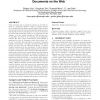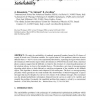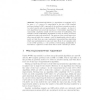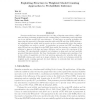58 search results - page 11 / 12 » Redundancy in Random SAT Formulas |
111
click to vote
WWW
2007
ACM
16 years 2 months ago
2007
ACM
Often scientists seek to search for articles on the Web related to a particular chemical. When a scientist searches for a chemical formula using a search engine today, she gets ar...
115
click to vote
CORR
2002
Springer
15 years 1 months ago
2002
Springer
: We study the satisfiability of randomly generated formulas formed by M clauses of exactly K literals over N Boolean variables. For a given value of N the problem is known to be m...
121
click to vote
STACS
2005
Springer
15 years 7 months ago
2005
Springer
Exponential algorithms, i.e. algorithms of complexity O(cn ) for some c > 1, seem to be unavoidable in the case of NP-complete problems (unless P=NP), especially if the problem ...
129
click to vote
JAIR
2011
14 years 8 months ago
2011
Previous studies have demonstrated that encoding a Bayesian network into a SAT formula and then performing weighted model counting using a backtracking search algorithm can be an ...
96
Voted
SAT
2009
Springer
15 years 8 months ago
2009
Springer
Abstract. We offer a new understanding of some aspects of practical SAT-solvers that are based on DPLL with unit-clause propagation, clause-learning, and restarts. On the theoreti...




